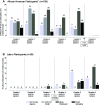Strategies to Build Trust and Recruit African American and Latino Community Residents for Health Research: A Cohort Study
- PMID: 26094679
- PMCID: PMC4626334
- DOI: 10.1111/cts.12273
Strategies to Build Trust and Recruit African American and Latino Community Residents for Health Research: A Cohort Study
Abstract
Background: This study used Community Partnered Participatory Research (CPPR) to address low participation of racial and ethnic minorities in medical research and the lack of trust between underrepresented communities and researchers.
Methods: Using a community and academic partnership in July 2012, residents of a South Los Angeles neighborhood were exposed to research recruitment strategies: referral by word-of-mouth, community agencies, direct marketing, and extant study participants.
Results: Among 258 community members exposed to recruitment strategies, 79.8% completed the study. Exposed individuals identified their most important method for learning about the study as referral by study participants (39.8%), community agencies (30.6%), word-of-mouth (17.5%), or direct marketing promotion (12.1%). Study completion rates varied by recruitment method: referral by community agencies (88.7%), referral by participants (80.4%), direct marketing promotion (86.2%), word of mouth (64.3%).
Conclusions: Although African American and Latino communities are often described as difficult to engage in research, we found high levels of research participation and completion when recruitment strategies emerged from the community itself. This suggests recruitment strategies based on CPPR principles represent an important opportunity for addressing health disparities and our high rates of research completion should provide optimism and a road map for next steps.
Keywords: African American; Community Partnered Participatory Research; Latino; recruitment; translational science; trust.
© 2015 Wiley Periodicals, Inc.
Figures

Similar articles
-
A Community-Partnered Approach to Developing Church-Based Interventions to Reduce Health Disparities Among African-Americans and Latinos.J Racial Ethn Health Disparities. 2019 Apr;6(2):254-264. doi: 10.1007/s40615-018-0520-z. Epub 2018 Aug 17. J Racial Ethn Health Disparities. 2019. PMID: 30120736 Free PMC article.
-
Understanding Barriers and Facilitators to Signing Up for a Mobile-Responsive Registry to Recruit Healthy Volunteers and Members of Underrepresented Communities for Alzheimer's Disease Prevention Studies.J Prev Alzheimers Dis. 2023;10(4):865-874. doi: 10.14283/jpad.2023.67. J Prev Alzheimers Dis. 2023. PMID: 37874109 Free PMC article.
-
Formative research to design a culturally-appropriate cancer clinical trial education program to increase participation of African American and Latino communities.BMC Public Health. 2020 Jun 3;20(1):840. doi: 10.1186/s12889-020-08939-4. BMC Public Health. 2020. PMID: 32493245 Free PMC article.
-
Community-based research: barriers to recruitment of African Americans.Nurs Outlook. 2004 Sep-Oct;52(5):234-40. doi: 10.1016/j.outlook.2004.04.012. Nurs Outlook. 2004. PMID: 15499312 Review.
-
Increasing minority research participation through community organization outreach.West J Nurs Res. 2006 Aug;28(5):541-60; discussion 561-3. doi: 10.1177/0193945906287215. West J Nurs Res. 2006. PMID: 16829637 Free PMC article. Review.
Cited by
-
Overcoming Historical Barriers: Enhancing Positive Perceptions of Medical Research Among African Americans Through a Conference-Based Workshop.J Gen Intern Med. 2021 Sep;36(9):2547-2554. doi: 10.1007/s11606-021-06736-2. Epub 2021 Jun 14. J Gen Intern Med. 2021. PMID: 34128196 Free PMC article.
-
Recruitment of African American Churches to Participate in Cancer Early Detection Interventions: A Community Perspective.J Relig Health. 2018 Apr;57(2):751-761. doi: 10.1007/s10943-018-0586-2. J Relig Health. 2018. PMID: 29488060 Free PMC article.
-
Best practices in nutrition science to earn and keep the public's trust.Am J Clin Nutr. 2019 Jan 1;109(1):225-243. doi: 10.1093/ajcn/nqy337. Am J Clin Nutr. 2019. PMID: 30657846 Free PMC article. Review.
-
Trial Forge Guidance 3: randomised trials and how to recruit and retain individuals from ethnic minority groups-practical guidance to support better practice.Trials. 2022 Aug 17;23(1):672. doi: 10.1186/s13063-022-06553-w. Trials. 2022. PMID: 35978338 Free PMC article.
-
Lessons learned for recruitment and retention of low-income African Americans.Contemp Clin Trials Commun. 2020 Jan 22;17:100533. doi: 10.1016/j.conctc.2020.100533. eCollection 2020 Mar. Contemp Clin Trials Commun. 2020. PMID: 32211558 Free PMC article.
References
-
- Israel B, Schulz A, Parker E, Becker A. Review of community based research: assessing partnership approaches to improve public health. Annu Rev Public Health. 1998; 19(1): 173–194. - PubMed
-
- Murthy VH, Krumholz HM, Gross CP. Participation in cancer clinical trials: race‐, sex‐, and age‐based disparities. JAMA. 2004; 291: 2720–2726. - PubMed
Publication types
MeSH terms
Grants and funding
LinkOut - more resources
Full Text Sources
Other Literature Sources
Medical

